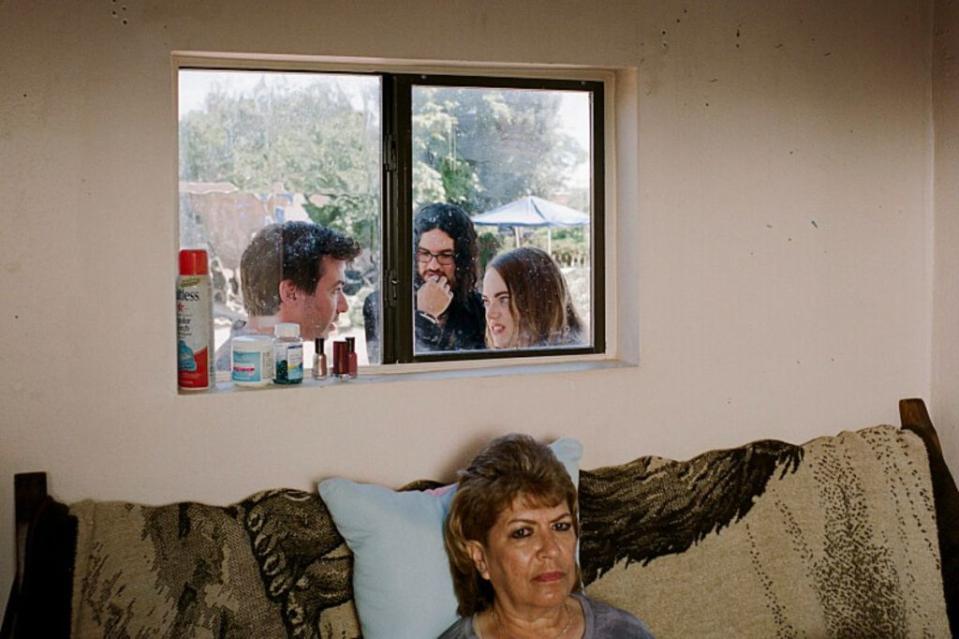The Curse Is Loaded, Unsettling, and Magnificent: Review
- Oops!Something went wrong.Please try again later.
The post The Curse Is Loaded, Unsettling, and Magnificent: Review appeared first on Consequence.
The Pitch: Married couple Whitney (Emma Stone) and Asher Seigel (Nathan Fielder) have struck a deal with HGTV to produce the pilot of their new eco-driven home flipping show, titled Flipanthropy. Set in what Whitney refers to as her hometown (it’s not) of Española, New Mexico, the show aims to follow Whitney and Asher as they flip rustic homes into what they call “Passive Houses,” which are carbon neutral, 100% sustainable homes that function as their own regenerative ecosystem.
Of course, the inside of these homes are decked out with high-end furniture, expensive eco-friendly appliances, and insulation that keeps the temperature at an average rate — but it’s the boxy, reflective exterior, made entirely of mirrors, that captures the attention of both HGTV and the surrounding community.
Not only are Whitney and Asher busy acquiring properties around Española, tearing them down, building new Passive Homes, and selling those redone properties for a significant profit, they feel a responsibility to engage with the town’s community — so, they open an upscale coffee house and jean shop, promise jobs and relocation to the town’s displaced citizens, and promote the show as a philanthropic mission to help Española. Producing the pilot and Flipanthropy overall is Asher’s old friend Dougie Schecter (Benny Safdie), a somewhat buffoonish character who still hasn’t quite processed his drunk driving collision that led to the death of his wife.
Meanwhile, the more uncomfortable aspects of Whitney and Asher’s plot begin to take shape: Whitney’s parents (played by Corbin Bernsen and Constance Shulman) are wealthy real estate developers in nearby Sante Fe, and are notoriously cruel to their tenants. Seeking to undo her association to them, Whitney overcompensates hard and does whatever she can to avoid the label of “gentrifier.”
Asher, on the other hand, is a former contractor and ex-Casino employee who will obey Whitney’s commands at the drop of a hat. Even from the outset, their relationship is tense and thorny — and with the pressures of selling the show, trying to have a baby, and doing right by the community, their anxiety levels are through the (insulated) roof.
One day, while grabbing B-roll in a nearby parking lot, Dougie suggests that Asher give money to a local girl named Nala (Hikmah Warsame) selling sodas. They get the footage, and Asher — realizing he gave the girl his only bill, which was $100 — takes the money back from Nala, who then curses him. He seeks to do right by the girl, especially at Whitney’s request, but fails to do so, setting in a growth of paranoia and misfortune that takes a significant toll on his psyche, even as they make the TV show of their dreams.

The Curse (Showtime)
The Theater of the Unnerving: The Curse is created and written by both Nathan Fielder and Benny Safdie, and it represents a perfect union of their storytelling strengths. Safdie’s unsettling work in Uncut Gems and Good Time is well-reflected in The Curse, which can often feel so charged and tense that any moment, the whole show — fictional and in reality — could completely fall apart. Meanwhile, in Nathan For You and The Rehearsal, Fielder set out to mine moments of comedy from both his awkward, cringe persona and the unexpected possibility of the real. Delightfully, The Curse is meta, but entirely fictional, and the surrounding characters of the show’s world are treated with such detailed realism and authenticity that the real-life absurdity of Fielder’s past projects seems dwarfed in comparison.
The resulting show is undoubtedly a career high for Fielder as both a television creator and a performer. He once again assumes the role of the pathetic, the inept, the cuckold — an aspect to all of his prior comedic characters — but this time, it’s treated as less of a “he’s being stupid, get it?” to the audience and more of a genuine character study.
There is a psychological depth to Asher that Fielder completely embodies; his feeble speaking voice and stunted gaze no longer a tool for just awkwardness. Instead, they’re a catalyst for contempt. When the ensuing paranoia sets in and Asher’s world begins to slowly cave in on itself, Fielder does not merely act as a passive sponge to the drama. He fights, he cries, he boils over, he retreats.
One aspect that Fielder nails in particular is a sense of adoration, though Asher loves his wife so much, in every single scene, that it weakens him. In the beginning, there’s something relatable and even sweet about his puppy dog affection towards Whitney — he will do whatever it takes to make her happy, even at the expense of himself. But eventually, his fixation and ensuing powerlessness can be revolting, and it heightens the tension between him, Whitney, Dougie, and the surrounding environment.
And then there’s Emma Stone, who embodies Whitney with a similar level of nuance and detail. As seen in all of Stone’s best work, her incredibly expressive face does a significant amount of moment-to-moment work for the camera; you can see her range of emotion in the smallest of eye rolls, in the way she code switches between the HGTV “I’m an ally” Whitney and the real, unfiltered Whitney. And above all, she carries Whitney with a kind of liberal righteousness that is subtle but recognizable, akin to the “I would have voted for Obama a third time” folks found in Jordan Peele’s Get Out.
Art and Artifice: Thematically, The Curse is loaded with commentary. Fielder’s prior work — especially The Rehearsal — often revolved around the concept of social performance. Performativity itself refers to the idea that speaking something makes it true; for example, when we utter “I do” at the wedding altar, that performative act of speech is what then completes the action of marriage, more so than signing a legal document. Much of our modern social dynamics are influenced by this concept, and in The Curse, there’s a great emphasis on the ways in which our lives are a performance.

The Curse (Showtime)
When Nala curses Asher in the parking lot, it could have easily been written off as a child’s jibe. But it’s Asher’s fixation on the moment of being cursed — the uttering of the words — that manifests in his reality. Meanwhile, Whitney is fixated on her good intentions manifesting into personal success. But when she screams to her parents, “Española is mine,” she, too, has cursed herself. Whatever good intentions she had become cancelled out by her quest to be Española’s white savior.
The Curse also looks deeper into the idea of both performative activism and the artifice that makes up our public-facing personas. Fascinatingly, Whitney seems to be aware of the difference between performative activism and actual activism, so much so that to remove herself from criticism, she throws money at the problem, as if to say she’s actually helping the community.
But there’s tension between Whitney’s alleged acts of altruism and the wealth that funds it; she takes her parents’ money (as a “loan,” she clarifies), but refuses to acknowledge the ways in which she benefits from her extraordinary privilege. She so desperately longs to be seen for who she truly is, but whether she’s filming the show, posting to her hundreds of Instagram followers, or vying for connection with Native American artist Cara (Nizhonniya Austin), she falls back into her fake, myopic, try-hard persona.
This is all emphasized beautifully by the show’s eerie, dynamic camera work. Dozens and dozens of shots take place through dusty windows, warped mirrors, car windshields, with drywall obstructing the frame. The directors smartly place surrounding slice-of-life motion in the foreground of shots; when Asher and Whitney argue outside a nearby house, we see an old woman watching TV as they bicker on the other side of the wall. In the aforementioned scene where Whitney begs her parents to let her have sole control of the new Española properties, they argue in a Mercedez Bens while field workers pick crops in the foreground of the shot.
It’s this type of juxtaposition that shows how futile Whitney’s and Asher’s mission to connect with the real folks of Española are, how removed they are from the realities of class and colonialism in America, and how people like them are hiding behind an artifice of good will.
The Verdict: The Curse, though occasionally painful and brooding, is a stunning television show. The ideas put forth are incredibly difficult to depict, especially in this meta-TV format — but the ways in which they physicalize these themes of class, gentrification, and the ethics surrounding them are bold and rewarding. There’s a confrontational nature to The Curse that feels deeply inspired; its interrogation of our systemic oppression of Native Americans and Hispanic folks is one thing, but the show goes on to demonstrate how white guilt can manifest in more harm to those communities than good.
The Curse may be a standout drama, but it unfolds more like a horror movie than anything else. Composer Daniel Lopatin (Oneohtrix Point Never)’s buzzing, anxiety-ridden score certainly aids in the creepy factor, but at the center of The Curse is a grey area between good and evil that stretches out to incomprehensible shapes. This is the work of Nathan Fielder, Emma Stone, and Benny Safdie firing on all cylinders. All it takes is one look into the warped mirrors of The Curse to see a caricature reflected back, and despite all the uneasiness, the show’s creators are begging you not to look away.
Where To Watch: The first episode of The Curse will be available to stream exclusively for Showtime and Paramount+ with Showtime subscribers on November 10th. It’ll air live on Showtime on Sunday, November 12th, and each subsequent episode will be available to stream every Sunday afterwards.
Trailer:
The Curse Is Loaded, Unsettling, and Magnificent: Review
Paolo Ragusa
Popular Posts
Peter Jackson Reunites The Beatles in Video for "Now and Then": Watch
Jimmy Page Covers "Rumble" in Honor of Link Wray at Rock and Roll Hall of Fame: Watch
Green Day Detail 2024 Stadium Tour with Smashing Pumpkins, Rancid, and The Linda Lindas
Johnny Hardwick's Cause of Death Unclear Due to Decomposition
Jimmy Buffett's Coral Reefer Band Plans to Continue Touring After His Death

